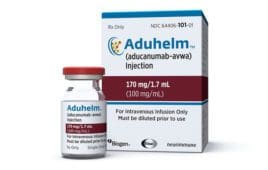 Cambridge, Massachusetts–based Amylyx has dosed the first participant in its phase 2 HELIOS clinical trial of AMX0035 focusing on Wolfram syndrome. The condition is an ultra-rare genetic disorder involving the endocrine system. Symptoms of Wolfram syndrome can include diabetes insipidus, diabetes mellitus, optic atrophy and hearing loss.
Cambridge, Massachusetts–based Amylyx has dosed the first participant in its phase 2 HELIOS clinical trial of AMX0035 focusing on Wolfram syndrome. The condition is an ultra-rare genetic disorder involving the endocrine system. Symptoms of Wolfram syndrome can include diabetes insipidus, diabetes mellitus, optic atrophy and hearing loss.
In September, Amylyx won FDA approval for AMX0035 (sodium phenylbutyrate and taurursodiol), marketed as Relyvrio, for adults with amyotrophic lateral sclerosis (ALS).
Both sodium phenylbutyrate and taurursodiol are smal molecules demonstrating neuroprotective effects in preclinical studies.
Trial design
The HELIOS is an exploratory open-label proof of biology study. Amylyx anticipates topline results from HELIOS in 2024.
The HELIOS trial is an exploratory open-label, single-group proof of biology study, with Amylyx anticipating topline results in 2024. The trial aims to assess the safety and efficacy of AMX0035 in adults diagnosed with Wolfram syndrome. The combination therapy is designed to reduce neuronal death by blocking cellular death pathways originating in the mitochondria and endoplasmic reticulum (ER).
The Phase 2 HELIOS clinical trial is an open-label, single-group assignment study designed to assess the safety, tolerability, and efficacy of AMX0035 in adult patients with Wolfram Syndrome. The trial will enroll roughly 12 participants. The trial design will feature a 24-week treatment period with AMX0035 administered orally, initially once daily for the first three weeks. After that portion, trial participants will receive AMX0035 twice daily for the remainder of the study, assuming participants tolerate the drug.
Eligibility criteria for HELIOS AMX0035 study
The primary outcome measures for the trial include evaluating the effect of AMX0035 on residual beta cell function by monitoring c-peptide levels during a 0-240 minute mixed-meal tolerance test (MMTT), and assessing the safety and tolerability of AMX0035 in adult participants with Wolfram Syndrome. Secondary outcome measures focus on the effect size of AMX0035 on visual acuity, total daily insulin dose, glucose range, and HbA1c levels.
Candidates for the trial must have a definitive diagnosis of Wolfram Syndrome and be at least 17 years old. In addition, they must have insulin-dependent diabetes mellitus due resulting from the syndrome and be willing to wear a continuous glucose monitoring (CGM) device for the study duration.
The study design excludes patients with pathologies that can alter the enterohepatic circulation of bile acids and those who received any investigational drug or device 30 days before the beginning of the study. Patients with a history of heart failure, history or family history of breast or ovarian cancer are also not eligible.
Orphan drug designation for AMX0035 and its implications
AMX0035 received orphan drug designation from the FDA in 2020, signaling the agency’s observation of the unmet need for treating Wolfram syndrome.
The FDA’s orphan drug initiative encourages pharma firms to develop novel therapies for rare disorders, such as Wolfram Syndrome, a degenerative neurological condition. The program awards orphan drug status to medications or biologics intended to diagnose, manage or prevent conditions impacting fewer than 200,000 individuals in the U.S. Investigational drugs with market entry costs surpassing projected sales are also eligible.
One of the key benefits of orphan drug designation is market exclusivity, which allows the drug developer to be the sole supplier of the drug for seven years if the drug is approved by the FDA. The designation also provides tax credits for clinical research expenses, waiver of FDA application fees, and eligibility for FDA grant funding to support clinical trials.
Eligible drug makers with orphan drug designation also may qualify for tax credits, FDA application fee waivers and grant funding to support clinical trials.
For Amylyx, the designation for AMX0035 in Wolfram syndrome can accelerate the drug’s development and approval process and provide a window for the firm to recoup the costs associated with bringing the drug to market.
Investors appear to have reacted positively to the news. In mid-day trading, Amylyx’s stock price ticked up by $1.54 (5.21%), hitting $31.00.
Filed Under: Neurological Disease





Tell Us What You Think!
You must be logged in to post a comment.